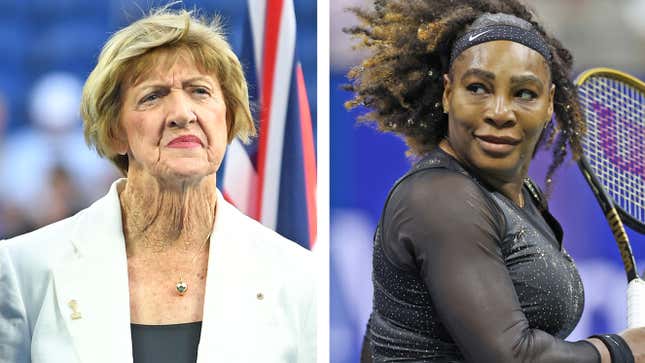
Most of the time, feminists are feminism’s biggest problem. It’s why Margaret Court has chosen this moment to hate on Serena Williams. Because like tennis, feminism is/was supposed to be something just for white women.
The Australian tennis “great” — and I use that term loosely, given that the true greats champion the ones that advance their sport — is upset and recently did an interview with Britain’s Daily Telegraph in which the 80-year-old basically revealed that she’s really jealous of Williams as their number of Grand Slam singles titles — Court has 24; one more than Williams — is the only reason why their names are ever mentioned together.
“Serena, I’ve admired her as a player,” said Court. “But I don’t think she has ever admired me,” as if the admiration of Court is mandatory for every woman that plays tennis.
“A lot of the press and television today, particularly in tennis, don’t want to mention my name,” she claimed. “The honor has not been there for what I did do. In my own nation, I have been given titles, but they would still rather not mention me.”
This is when it gets spicy.
“I came back after two babies,” Court exclaimed. “After having the first baby, I won three out of the four Slams. Serena hasn’t won a Slam since,” (becoming a mother).
Margaret Court is the new Jan Brady.
What Venus Williams started, and what Serena took to another level, is at the heart of why Court is so perturbed. Because not only did the Williams sisters revitalize the sport that Court loves so much, forever changing the game for women of color, and making it must-see-TV — they did it as two little Black girls, and later as Black women, that dominated something that she felt was supposed to only be for her kind.
From the start, Serena Williams has irked people. And when I say people, I mean white people. For some, it was the braids and the way she yelled while playing. For others, it was “those outfits” and how they fit a body that tennis had never seen. But most of all, it’s her being unbothered.
From the racists at Indian Wells to the outlawing of her catsuit, or the outburst against officials that were nowhere as bad as the ones we’ve historically — and currently — seen from the men in tennis, the thing that kept infuriating the ones that hated her, and making the ones that adored her love her even more, is that besides never flinching, she was so ridiculously good at what she did you had to respect it, even if you didn’t want to.
It’s why you could hear the frustration in Chris Evert’s voice during the U.S. Open. Because despite how much she tried to rain on Serena’s parade, she couldn’t.
There’s a reason why Court decided to give an interview once Serena’s career was done. Like Evert, she just couldn’t stand by and let this Black woman be adorned and finally appropriately given her flowers. Instead, she found a way to make it about her, and the things she went through. Because like in feminism, the Black woman’s plight is secondary, at best.
But yet, Court is just the latest white woman that’s faulted against Serena. In the past, there was the fake “rivalry” with Maria Sharapova that too many in the media tried to sell, even when it was always a weak narrative. You can’t be Serena’s rival when your record against her was 2-20, and the last time you beat her Coco Gauff was just a few months old.
And earlier this year, white female filmmaker Jane Campion — who is from New Zealand, off the coast of Australia — decided to use her speech at the Critics Choice Awards to punch down at Serena, and Venus, because she felt her plight against misogyny in filmmaking was greater than anything that two Black women who gave a white sport some color could ever deal with or overcome.
“Venus and Serena, you’re such marvels. However, you don’t play against the guys, like I have to,” said Campion.
I would say it’s reminiscent of a “crab in the barrel” mentality. But, in situations like this, it’s similar to the playground. Campion was the kid that the bully was cracking jokes on, but instead of addressing the bully, she chose to direct her attention to the two kids that were minding their business laughing along like everyone else. This is how you weaponize whiteness.
In the end, Campion, like Evert and Sharapova will be footnotes in the story of Serena Williams and never the chapters they hoped to be. And as for Margaret Court, she will also be remembered as the woman who has “one more” than Serena — which is an amazing accomplishment when you think about it.
But, the love that Court craves so much? That will never come to pass. We saw something similar in 2017 when Draymond Green had to remind Paul Pierce that like Margaret Court, he would never be revered on the level of Kobe Bryant, or in this case, Serena Williams.
“Chasing that farewell tour, they don’t love you like that. You can’t get no farewell tour. They don’t love you like that … You thought you was Kobe.” Same applies here.